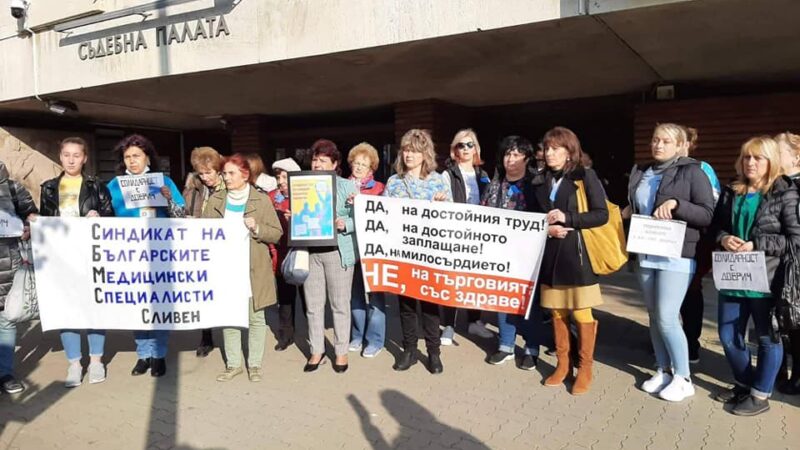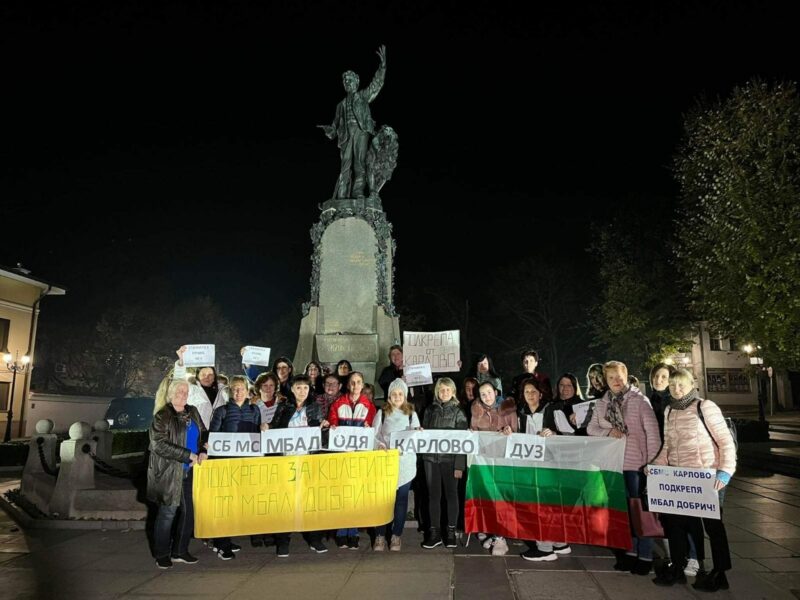 [1]
[1]Nurses protest in Sliven, Bulgaria. Photo provided by the Union of the Bulgarian Nurses with permission to republish.
In early November, something unprecedented happened in Bulgaria: Dr. Georgi Zhelyazkov, the director of a key hospital in the city of Dobrich [2], the capital of the North Eastern province [3] bordering Romania and the Black Sea, filed a lawsuit [4] against 136 medical workers who, as he found out, intended to participate in an strike to demand better working conditions and higher wages. The next judiciary session is going to be in March this year.
Nevertheless, the medics started their strike on November 10. Over the next days, some of the strikers withdrew, but around 30 nurses, one doctor and two health officers continued protesting. At the time of publishing, the strike is on hold while the trial is being held. For many of the protesters, it was nevertheless symbolic, as they continued covering shifts. The protesters couldn't afford to lose their income, and they couldn't leave their patients and allow the medical system to collapse without them.
In 2019 [5] and 2020, nurses all over Bulgaria started series of protests. They paused during the COVID-19 pandemic, as their focus shifted towards ensuring survival for the patients and themselves. Meanwhile Bulgarian authorities failed to fulfill their promise [6] to bring the medical workers’ salaries up to the level of basic minimal salary of BGN 1500 (around USD 815). Public appreciation for their importance to society during the pandemic didn't lasted long.
Nurses complained to Global Voices of another insufficient media coverage of their recent October protests in the Bulgarian cities of Sliven [7], Dobrich [8], Vratsa [9], Kyustendil [10], and Blagoevgrad [11]. Key demands include implementation of a minimum salary within the sector — which was already negotiated [12] with the government, but has not been approved by all hospitals so far. Others demands included increasing pay for night shifts, and increase of the value of food vouchers provided.
The collective agreement was made on a three-sided negotiated basis — between the state, trade unions and medical workers. However, such an agreement, the sector collective labor contract [13], has a prescriptive function. As representatives of the nurses explained to Global Voices, the increased salaries for medics, as stipulated in the collective agreement, doesn't automatically lead to an increase of remuneration at a specific hospital, which has to make its own decision.
Therefore, the strike in Dobrich, organized by the Union of the Bulgarian Nurses [14] put the demands for increased salaries to the employer, the Multiprofile Hospital for Active Treatment, Dobrich. This union is an alternative to trade unions operating at the national level and is a key organizer of protests in other cities, like Sliven [15], located in Central Bulgaria. It was registered in 2019, and is lead by non-conformist medics who want to change the situation of the nurses in the context of the health system by reaching the minimal levels of basic salaries previously negotiated between the state, syndicates and hospitals for the medical workers.
 [16]
[16]Nurses from Tervel express solidarity with nurses from Dobrich [17]. Photo provided by the Union of the Bulgarian Nurses with permission to republish.
And while Bulgarian media and society don't express explicit concern for these issues, many nurses continue working more than 12 hours a day. According to the Union of the Bulgarian Nurses, at some hospitals they take shifts of a 24- or even 36-hour duration. Also, many of them work at several places at the same time to make ends meet. In the meantime, the overall number of nurses on a national level also shrinks [18], and many of them are either in pre-or post-pension age.
The nurse who sued several hospitals
Maya Ilieva, a well-known activist among her peers, is a key participant in the Dobrich protest. А representative of the Union of the Bulgarian Nurses, she has 27 years of work experience, of which 23 years were spent as a reanimation nurse in the capital's heart surgery hospital. During the protests in 2019, she was dismissed from the Tokuda hospital in Sofia. Ilieva sued her employer and won the trial at first instance [19], and at the moment her case is under Court of Appeals. She has also won five lawsuits against the same hospital, including a discrimination complaint, with the court deciding [20] that basis of the discrimination was her trade union affiliation.
In 2019, when the alternative union was registered, Ilieva was chosen as head of the Board. After her dismissal from the Tokuda hospital the same year, she started working in another hospital in the same city. When the pandemic started, she was among the first volunteers for the COVID-19 Reanimation Ward. However she was laid off after she blew the whistle [21] by informing the media about the deficit of medical supplies.
 [22]
[22]Nurse Maya Ilieva at the 2019 protest. Courtesy photo provided by her with permission to republish.
According to Ilieva, the situation in Dobrich is critical, due to the lack of specialists. She and other participants in the protest say that one of the units of the hospital for example has only one nurse who needs to combine the roles of a senior, surgical and a regular nurse, “all in one.”
“It is difficult to imagine how a schedule is made with only one nurse,” Ilieva said, adding that such nurses have to virtually live in the hospital. According to her, the situation in many hospitals throughout the country is more or less the same.
 [23]
[23]Nurses from Karlovo [24] express solidarity with nurses from Dobrich. Photo provided by the Union of the Bulgarian Nurses with permission to republish.
The number of nurses has been rapidly decreasing [18] across the country. According to the Bulgarian Association of Professionals of Health Care, which leads a registry, there is a deficit [25] of more than 35,000 medical nurses in the Bulgarian healthcare system. Ilieva summarized the situation:
One nurse serves between thirty and forty patients on the average, and during COVID the number reached sixty. It is not rare for one nurse to combine several roles for one salary only. The night shifts are paid low.
Ilieva assumes employers resist the increase of basic salaries because that would imply an increase of so called work time class (a salary percentage which increases with every year of service), as well as rates for overtime work. She explains:
In the hospital, there is an overtime between 40 and 240 hours monthly, while overall only 150 hours is permitted annually by law. This is why the hospital director prefers paying two thirds of the salary in the form of bonuses, the so-called additional material stimulation. By this, he puts the employees in a dependent position, depending on his goodwill when distributing the resources.
The protests in the city of Sliven
Nadezhda Margenova from Sliven is one of the founders of the alternative trade union of nurses. In order to support the protests in the end of 2022, she had to take unpaid leave. The union demanded an increase of basic salaries to the extent agreed in the collective agreement, and unsuccessfully negotiated with the Regional Hospital in Sliven till the end of November.
For 15 years in a row, the hospital has been refusing to join the collective agreement. Margenova and her colleagues believe that the nurses employed there have the lowest salaries (around 655 dollars basic salary), compared the other hospitals in the city. Many nurses would rather work in kindergartens and schools with better pay and conditions than in hospitals where they often have to do multiple consecutive night shifts.
According to Margenova, who has been a nurse for many years, unlike other EU countries like Germany and Italy, syndicalism [27] in Bulgaria is “practically dead” as large national level trade unions don't put effort into enforcing the signed tripartite collective agreements, and make no attempts to mobilize union members for protests. According to her, this leads to a “non-utilization of the potential of the effective strike,” which is “the last means of the syndical battle.”
Като цяло съсловието е на изчезване. Разполагаме с 20 хиляди медицински сестри, една трета от тях са в пенсионна вързраст, една трета са в предпенсионна възраст. Остават едни 7 хиляди които трябва да се разпределят в функционирането на 400 болници, отделно социални заведения, кабинети, детски ясли, градини, училища, центрове за спешна медицинска помощ, т.е. това е невъзможно, дори и при работа на втори трудов договор. Млади кадри няма, те са малко и са избрали професията основно за да могат да работят в чужбина, където са добре дошли.
In general, the profession is on its way to becoming extinct. The real picture is the following: we have around 20,000 medical nurses currently in Bulgaria. One third of them are at pension age, one third, pre-pension. There are 7000 who must be distributed in order for the functioning of 400 hospitals to be possible, as well as social institutions, cabinets, nurseries, kindergartens, emergency wards. This is impossible, even they have a second contract on a mass scale. There are no young people, they are very few and they have chosen their profession primarily in order to be able to work abroad, where they are welcome
Margenova has a gloomy prognosis for the prospects of nurses in Bulgaria, most of whom now generally fall in this category of the working poor, and are not part of the so-called middle class:
“The turmoil is yet to happen within the hospital system, and this won’t be due to the lack of doctors, but due to the lack of nurses.”
